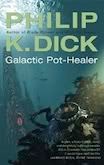2010 books

27) Philip K. Dick, Galactic Pot-Healer, 1969
In a totalitarian Cleveland in 2046, Joe Fernwright has a meaningless life as a ceramic pot-healer in a society that has no more use for his skills. Out of the blue he gets a call from the Glimmung, a god-like alien entity who wants him to relocate to Plowman's Planet to be part of a multi-species effort to raise Heldscalla, a submerged and ancient alien cathedral, but Fernwright soon finds he's caught up in a kind of Faustian quest that's destined to failure. I found the first half of this novel to be very tight and entertaining, but that sense of focus dissipated towards the end as the dramatic action takes over, which Dick was less able to describe nearly as proficiently as his mapping out of the novel's psychic territory (I find Dick's writing frequently falls apart this way). His two best ideas here are the Game, in which book and film titles are translated then retranslated back using translation software, then are used as puzzles to entertain Fernwright and his bored friends around the world; I also liked Dick's idea of The Book of the Kalends - a kind of written, ever-changing Wikipedia that encompasses the future as well as the past and present. Despite its Roman name (from which we get the word 'calendar') it's probably a riff on the Chinese I Ching, the Book of Changes which is similarly all-encompassing from past to future and which Dick also used to structure some of his plots - I detect there is possibly some of that going on here too. The Book of the Kalends engages the usual Dickian questions about free will, predeterminism and precognition, and while Galactic Pot-Healer isn't a bad book at all with a closer look I expect there are several more meanings that, like the cathedral, Dick would like the reader to pull out from under the surface.